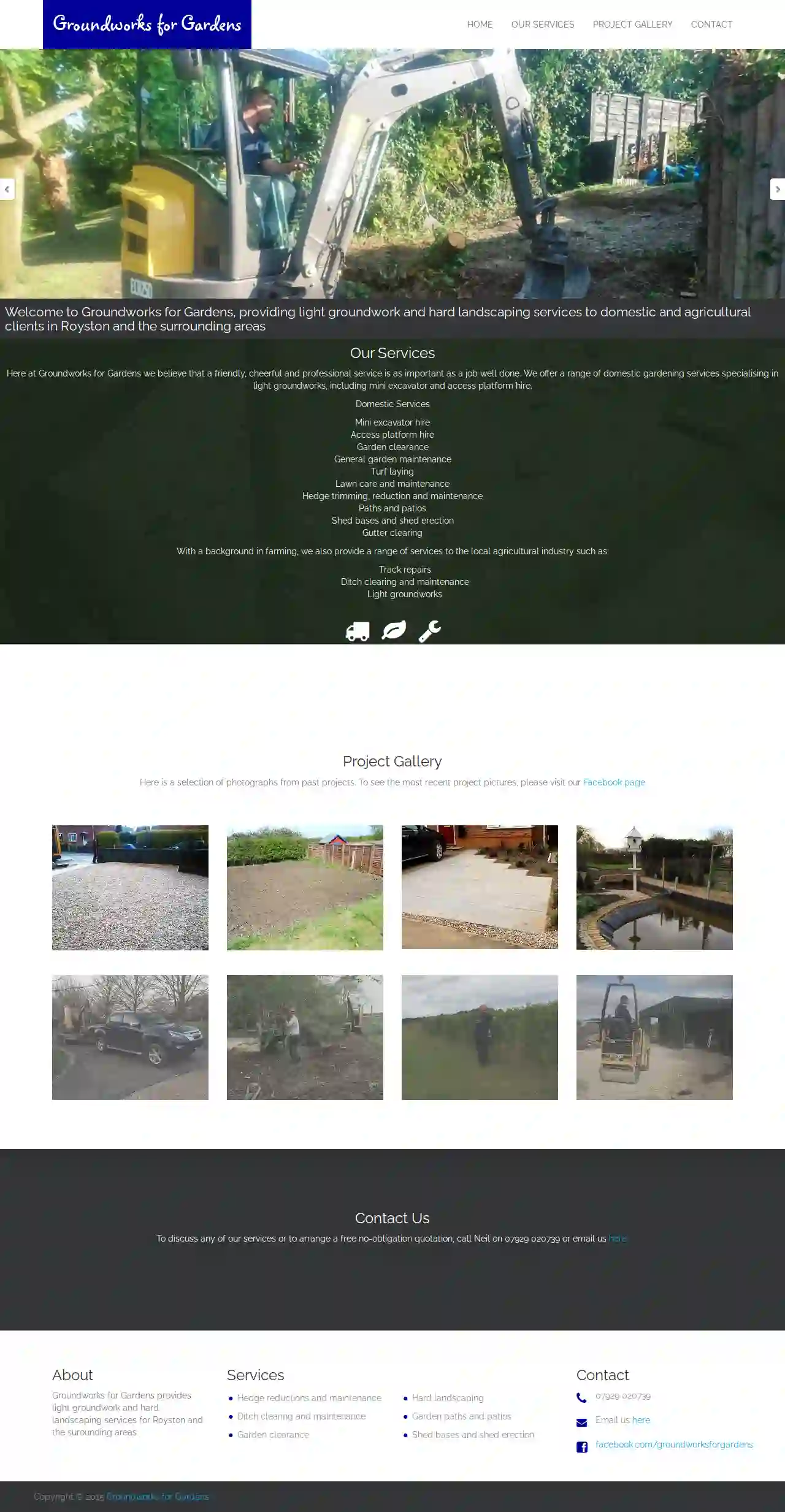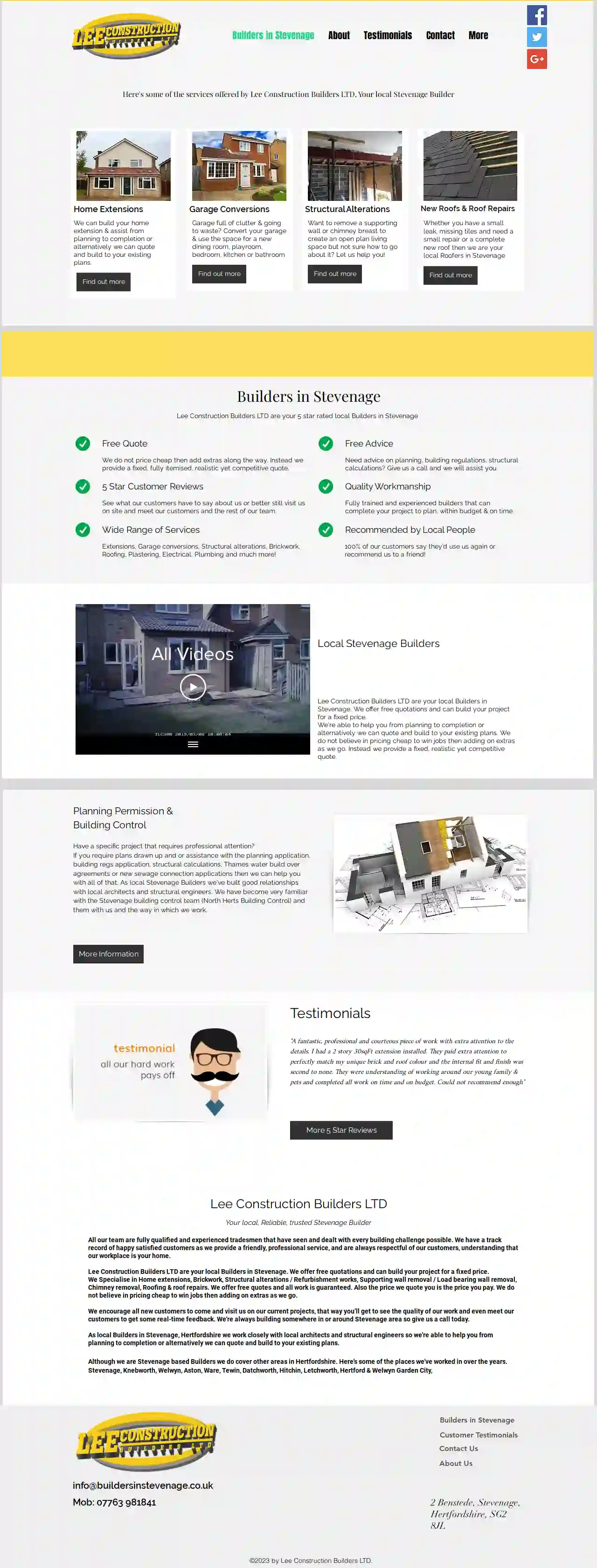Excavation Contractors Sandridge
Top Digging Contractors in Sandridge
Receive multiple Excavation Contractors quotes for your project today! Compare profiles, reviews, accreditations, portfolio, etc... and choose the best offer.

Groundworks for gardens
56 reviewsHertford, GBWelcome to Groundworks for Gardens Groundworks for Gardens provides light groundwork and hard landscaping services for Royston and the surrounding areas. We believe that a friendly, cheerful and professional service is as important as a job well done. We offer a range of domestic gardening services specialising in light groundworks, including mini excavator and access platform hire. With a background in farming, we also provide a range of services to the local agricultural industry such as track repairs, ditch clearing and maintenance, and light groundworks.
- Services
- Why Us?
- Gallery
Get Quote
Lee Construction Builders LTD
571 reviews2 Benstede, Stevenage, SG2 8JL, GBLee Construction Builders LTD Your local, Reliable, trusted Stevenage Builder All our team are fully qualified and experienced tradesmen that have seen and dealt with every building challenge possible. We have a track record of happy satisfied customers as we provide a friendly, professional service, and are always respectful of our customers, understanding that our workplace is your home. Lee Construction Builders LTD are your local Builders in Stevenage. We offer free quotations and can build your project for a fixed price. We Specialise in Home extensions, Brickwork, Structural alterations / Refurbishment works, Supporting wall removal / Load bearing wall removal, Chimney removal, Roofing & roof repairs. We offer free quotes and all work is guaranteed. Also the price we quote you is the price you pay. We do not believe in pricing cheap to win jobs then adding on extras as we go. We encourage all new customers to come and visit us on our current projects, that way you’ll get to see the quality of our work and even meet our customers to get some real-time feedback. We're always building somewhere in or around Stevenage area so give us a call today. As local Builders in Stevenage, Hertfordshire we work closely with local architects and structural engineers so we're able to help you from planning to completion or alternatively we can quote and build to your existing plans. Although we are Stevenage based Builders we do cover other areas in Hertfordshire. Here's some of the places we've worked in over the years. Stevenage, Knebworth, Welwyn, Aston, Ware, Tewin, Datchworth, Hitchin, Letchworth, Hertford & Welwyn Garden City
- Services
- Why Us?
- Testimonials
- Gallery
Get Quote
Herts and Essex Site Investigations (HESI)
54 reviewsUnit J8, Peek Business Park, Woodside, Bishops Stortford, Hertfordshire, CM23 5RG, GBExperienced Geotechnical & Environmental engineers HESI is a well-established company based in the South-East of England and offer a wide range of Geotechnical and Environmental Services across the south of England and wider area extending to the north. HESI offer a wide range of services to a huge array of clientele and consistently strive to meet clients needs for an economical but thorough service. Our expertise provides: Pragmatic approach HESI offer a direct and pragmatic approach to site investigation providing a quick and easy service for our clientele to develop construction sites. We provide a hands on service with an energetic delivery of resources and data. Rapid response HESI can provide rapid responses to clients needs. Often a speedy inspection or site visit is required and HESI strive to meet the needs of clientele. Health and Safety HESI provide all necessary Health and Safety information to enable all works to proceed in line with best practice and can provide Risk Assessment and Method Statements for all elements of works. Discreet service HESI can provide a discreet service where required to minimise disturbance in delicate sites which may require a level of discretion.
- Services
- Why Us?
- Our Team
- Testimonials
- Gallery
Get Quote
Herts Electrical Contractors Ltd
125 The Wenta Business Centre, 1 Electric Avenue, Enfield, EN3 7XU, GBHEC Electricians: Your Trusted Partner for Electrical Maintenance HEC Electricians is a reputable electrical maintenance company with extensive experience in maintaining facilities across the South East of England, London, and the Home Counties. We have a strong foundation in the building trade, having worked on projects ranging from new houses to apartment blocks. This experience has given us a deep understanding of building construction, which we leverage in our specialized field of ongoing facilities maintenance. We are committed to providing high-quality services and ensuring the reliability of our work. Our goal is to assist you in meeting your clients' needs, and we maintain the highest standards in all aspects of our business. Our team of fully trained operatives holds Construction Scheme Safety Certificates (CSCS), ensuring that all work is carried out safely and efficiently. We are dedicated to upholding the reputation of our clients' businesses. Contact us today for a free quote on 07850 536 116 or email us at [email protected].
- Services
- Why Us?
- Gallery
Get Quote
Chantry Construction Herts Ltd
Hertford, GBChantry Construction: Your Trusted Building Partner in Stevenage As a well-established and reputable company, Chantry Construction (Herts) Ltd provides a comprehensive range of building and construction services for commercial and domestic clients in Stevenage and the surrounding areas. With over 30 years of experience, we've built a strong foundation of skills and expertise within the building industry, allowing us to tackle a wide variety of projects. From general building repairs to major construction work, we're your one-stop shop for all your building needs. We pride ourselves on delivering high-quality workmanship, competitive prices, and a friendly, professional service at all times. Our commitment to customer satisfaction is evident in our dedication to providing fully insured services and guaranteeing all our work for your peace of mind. Whether you're looking for a new driveway, a property extension, or anything in between, we're here to help. We've achieved fantastic results for our clients over the years, and we're confident we can do the same for you. Contact us today to discuss your building improvements in more detail.
- Services
- Why Us?
- Gallery
Get Quote
OJP Contracts ltd
51 reviewsThe Cattlesheds, Brickendon, Hertfordshire, SG13 8NT, GBOur History OJP Contracts was established in 2017, drawing upon a deep-rooted family history in farming, agriculture, haulage, and groundworks. The need to modernize and expand the family farm in response to a changing industry led OJP to diversify its operations. OJP Contracts is a passionate company dedicated to delivering projects to the highest standards. We believe in getting the job done right the first time, with exceptional communication and customer interaction, consistently exceeding expectations. Our work is primarily driven by reputation, and we believe word-of-mouth advertising is the most effective form. We carefully select our team members to ensure they embody our core values of "right first time" and "solutions-oriented." We continuously invest in new equipment, vehicles, and tools, along with extensive training for our staff, encompassing the following: Our Staff SMSTS SSSTS CSCS up to gold card Qualified operators of all in-house plant (excavators, dumpers, forklift, telehandler, tractor, crane operator and slinger) Working at height Harness awareness Face fit tested PASMA ALLMI IPAF Abrasive wheels Thames water Passports UKPN substation entry Asbestos Awareness trained Blue water hygiene SHEA gas Our Team Oliver Peters - Director Oliver founded the company in 2017 with the vision of building a business that could handle all aspects of groundworks and civils. Since then, we have continued the agricultural side of the company and expanded into installations and winter maintenance. Prior to starting OJP, Oliver studied at Harper Adams University, where he earned a degree in Engineering. The business has been built on the experience and knowledge he has gained in various sectors of industry, providing a well-rounded perspective to tackle new challenges and opportunities that the business faces. Feel free to contact Oliver at [email protected] Tom Osborne – Operations Director Tom joined OJP Contracts in 2021, bringing with him 13 years of experience working in the construction and civil engineering industries on a wide range of projects for several tier 1 contractors. Tom began his career as an assistant site manager, progressing to site manager and project manager on numerous high-profile projects before taking on a contracts manager role, overseeing multiple schemes. Tom has joined OJP as the operational lead and oversees the management of projects from the enquiry and tender stage, through delivery and aftercare, ensuring each project meets the high standards.
- Services
- Why Us?
- Our Team
- Testimonials
- Gallery
Get Quote
Tree Heritage
4.236 reviewsNorth Rd, Hertford, SG14 2PW, GBMaking gardens beautiful since 1970. Tree Heritage is one of Hertfordshire's longest established landscape gardening companies. With over 50 years of experience, our professional team of skilled landscape gardeners Hertfordshire offer a comprehensive range of services including garden design, clearance, planting, tree surgery, maintenance, and landscaping work. We even construct a variety of garden features, such as ponds, patios, and many others to create a complete outdoor oasis. Tree Heritage’s highly skilled and experienced landscapers have the capability to help you achieve the perfect garden that suits your needs, style and budget. With a vast customer base, positive reviews, and a long-standing reputation, we have become the perfect choice for individuals and businesses alike who seek excellence in landscaping services.
- Services
- Why Us?
- Gallery
Get Quote
Grafton Building Consultancy Ltd
43 reviews15 Mead Business Centre, Mead Lane, Hertford, 15 Mead Business Centre Mead Lane, SG13 7BJ, GBWelcome to Grafton Building Consultancy At Grafton Building Consultancy, we offer expert, professional advice at every stage of the property lifecycle. The firm’s core capability in architectural design, contract administration and surveying is complemented by a broad spectrum of specialist consultancy services, all delivered to a wide range of clients.
- Services
- Why Us?
- Testimonials
- Gallery
Get Quote
Elliotts Drainage Solutions
4.927 reviewsUnit 13 Chells Ind. Estate, Stevenage, SG2 0LQ, GBProfessional drainage services for commercial, industrial and residential clients across the UK. From drain CCTV surveys and tanker services to unblocking and repairs, we’ve got you covered. We provide drainage services on a one-off call out basis, project works or on a retained PPM schedule for retained clients to keep your drainage systems working efficiently. WHY CHOOSE ELLIOTTS DRAINAGE? See for yourself
- Services
- Why Us?
- Gallery
Get Quote
Oval Construction - House Extensions Hertfordshire | Loft Conversions | Kitchen Renovations
53 reviewsOval Construction, Letchworth Garden City, England, SG6 2NZ, GBOval Construction: Your Trusted Partner for Building & Maintenance in Hertfordshire Oval Construction is a leading provider of quality building and maintenance services in Hertfordshire, with over 25 years of experience. We are based in the heart of Letchworth Garden City and proudly serve Stevenage, Hitchin, and the surrounding areas. Our expertise lies in a wide range of services, including loft conversions, full house refurbishments, house extensions, kitchen renovations, and bathroom renovations. We are committed to delivering exceptional results by employing fully qualified and insured tradespeople. Our dedicated team covers a wide range of services, including painting, carpentry, bricklaying, plumbing, electrical work, tiling, plastering, and groundwork. We are dedicated to providing efficient, cost-effective solutions tailored to your needs. From start to finish, we prioritize superior craftsmanship and attention to detail, ensuring your complete satisfaction. Contact us today to transform your home with precision and expertise.
- Services
- Why Us?
- Gallery
Get Quote
Over 13,059+ Excavation Pros in our network
Our excavation contractors operate in Sandridge & beyond!
ExcavationHQ has curated and vetted the Best Excavation Companies in Sandridge. Find a reliable contractor today.
Frequently Asked Questions About Excavation Contractors
- Determine the Area: Measure the length and width of the area you want to fill. Multiply them to get the area in square feet (or meters).
- Determine the Depth: Measure the difference between the existing grade and the desired grade (how much you need to raise the ground). This is the depth of fill required.
- Calculate Volume: Multiply the area (step 1) by the depth (step 2) to get the volume in cubic feet (or meters).
- Account for Compaction: Fill dirt compacts when it settles, so add 10% to 25% to the calculated volume to account for compaction. The exact percentage depends on the type of fill material.
- Experience: Choose contractors with a proven track record and years of experience in excavation projects similar to yours.
- Licensing and Insurance: Verify that they are properly licensed to operate in your area and carry adequate insurance to protect you from liability in case of accidents or damage.
- Equipment and Resources: Ensure they have the necessary equipment and resources to handle your project efficiently and safely.
- Positive Reviews and References: Check online reviews and testimonials from previous customers. Request references and contact them to inquire about their experience with the contractor.
- Professionalism: Opt for a company that communicates clearly, provides detailed and transparent estimates, and has a responsive and courteous team.
- Project Type and Size: Ensure the contractor has experience handling projects similar to yours in scale and complexity.
- Reputation and Reviews: Check online reviews and testimonials, and request references from previous clients.
- Licensing and Insurance: Verify that the contractor is properly licensed and insured to protect you from liability.
- Equipment and Resources: Confirm that they have the necessary equipment and resources for your project's needs.
- Communication and Transparency: Choose a contractor who communicates clearly, provides detailed estimates, and keeps you informed throughout the project.
- Safety Record: Inquire about their safety protocols and track record to ensure a safe work environment.
- Price: While price is important, it shouldn't be the only deciding factor. Balance affordability with experience, reputation, and quality of service.
What is the difference between cut and fill excavation?
Cut: Involves excavating soil from an area where the existing grade is higher than the desired grade.
Fill: Refers to using the excavated soil ('cut' material) to raise the grade in an area where the existing grade is lower than desired.
This method minimizes the need to import or export soil, reducing costs and environmental impact. It's commonly used for site preparation, road construction, and landscaping.
How do I calculate how much dirt I need for fill?
How do I find a good excavation contractor?
How do I choose the right excavation contractor for my project?
What is the difference between cut and fill excavation?
Cut: Involves excavating soil from an area where the existing grade is higher than the desired grade.
Fill: Refers to using the excavated soil ('cut' material) to raise the grade in an area where the existing grade is lower than desired.
This method minimizes the need to import or export soil, reducing costs and environmental impact. It's commonly used for site preparation, road construction, and landscaping.
How do I calculate how much dirt I need for fill?
- Determine the Area: Measure the length and width of the area you want to fill. Multiply them to get the area in square feet (or meters).
- Determine the Depth: Measure the difference between the existing grade and the desired grade (how much you need to raise the ground). This is the depth of fill required.
- Calculate Volume: Multiply the area (step 1) by the depth (step 2) to get the volume in cubic feet (or meters).
- Account for Compaction: Fill dirt compacts when it settles, so add 10% to 25% to the calculated volume to account for compaction. The exact percentage depends on the type of fill material.
How do I find a good excavation contractor?
- Experience: Choose contractors with a proven track record and years of experience in excavation projects similar to yours.
- Licensing and Insurance: Verify that they are properly licensed to operate in your area and carry adequate insurance to protect you from liability in case of accidents or damage.
- Equipment and Resources: Ensure they have the necessary equipment and resources to handle your project efficiently and safely.
- Positive Reviews and References: Check online reviews and testimonials from previous customers. Request references and contact them to inquire about their experience with the contractor.
- Professionalism: Opt for a company that communicates clearly, provides detailed and transparent estimates, and has a responsive and courteous team.
How do I choose the right excavation contractor for my project?
- Project Type and Size: Ensure the contractor has experience handling projects similar to yours in scale and complexity.
- Reputation and Reviews: Check online reviews and testimonials, and request references from previous clients.
- Licensing and Insurance: Verify that the contractor is properly licensed and insured to protect you from liability.
- Equipment and Resources: Confirm that they have the necessary equipment and resources for your project's needs.
- Communication and Transparency: Choose a contractor who communicates clearly, provides detailed estimates, and keeps you informed throughout the project.
- Safety Record: Inquire about their safety protocols and track record to ensure a safe work environment.
- Price: While price is important, it shouldn't be the only deciding factor. Balance affordability with experience, reputation, and quality of service.